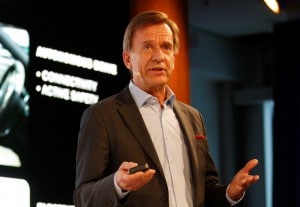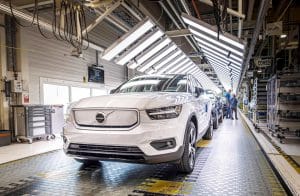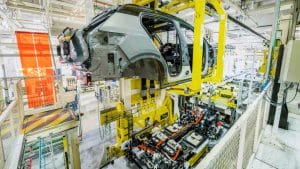
Volvo has already set out an aggressive plan to migrate to plug-in hybrids and all-electric models but CEO Håkan Samuelsson said Thursday that he would “be surprised” if Volvo was selling anything but pure battery-electric vehicles by 2030.
While falling just short of a firm commitment, Volvo appears to be moving in the same direction as a growing list of its competitors, an industrywide shift accelerated by new emissions and fuel-efficiency standards making it harder and harder to sell vehicles relying on internal combustion engines.
“I would be surprised if we wouldn’t deliver only electric cars from 2030,” Samuelsson said during the Financial Times Future of the Car Summit on Thursday.
(Volvo launches production of XC40 Recharge, its first long-range BEV.)
Volvo was one of the first automakers to commit to using some form of electrified drivetrain across its line-up. It now offers the plug-in T8 “Twin Engine” in products like the XC90 SUV and S60 sedan. The automaker also has launched its first all-electric model, the XC40 Recharge, for the 2021 model year.

It also launched the electrified Polestar sub-brand this year. Polestar currently offers both a high-performance plug-in hybrid and an all-electric offering. Going forward, the marque will add only pure battery-electric vehicles, or BEVs.
Under its main badge alone, Volvo expects about 20% of its global sales to come from electrified offerings this year, with such products targeted to yield fully half of its volume by 2025.
How fast the brand goes to an entirely BEV line-up will rely on external forces, Samuelsson said during the automotive event.
“The way forward would be to have clear rules on when we need to exit the combustion market,” he explained, adding, “Once you have realized that the petrol and diesel engine are really not part of the future, it’s rather easy to see you have to move fast into the new world.”
(Volvo may add new all-electric XC20 SUV.)
Pressure to move fast has been mounting in recent months. In November, for example, the United Kingdom announced that it was moving up to 2030 a ban on the sale of vehicles relying solely on internal combustion engines, though hybrids will continue to be marketed through 2035. The UK originally planned its IC ban to go into effect in 2040.
Japan, meanwhile, is considering a similar ban on IC engines sometime by the mid-2030s, according to a new report by the Nikkei Asian Review.

A number of other countries, including France, Germany, Norway and India, have either enacted similar bans or are studying such rules. China, for its part, this autumn said it is targeting a 20% mix of “New Energy Vehicles,” including plug-ins and BEVs, by 2025. The Asian nation, the world’s largest car market, is investigating an outright ban.
A number of states and cities, including Berlin, London and Paris, are also expected to ban both the sale of ICE vehicles and even their use in central zones. California, meanwhile, is moving forward on its own phase-out of gas and diesel cars and trucks and its rules will be copied by many other states across the U.S.
Volvo’s push into electric vehicles likely will depend upon another factor: the broader strategy of its Chinese parent, Geely Automotive, which also sells vehicles under the Geely, Lynk & Co, Proton, Lotus and London Electric Vehicle Company (LEVC) badges.
(Volvo moves forward with plans to build batteries.)
Geely, meanwhile, announced a deal last month to work with Germany’s Daimler AG to develop what was jointly described as a “highly efficient” hybrid drive system. Details were not revealed but it is widely believed to be a plug-in design that could be used by all the various Daimler and Geely brands, including their Mercedes-Benz and Volvo units.







